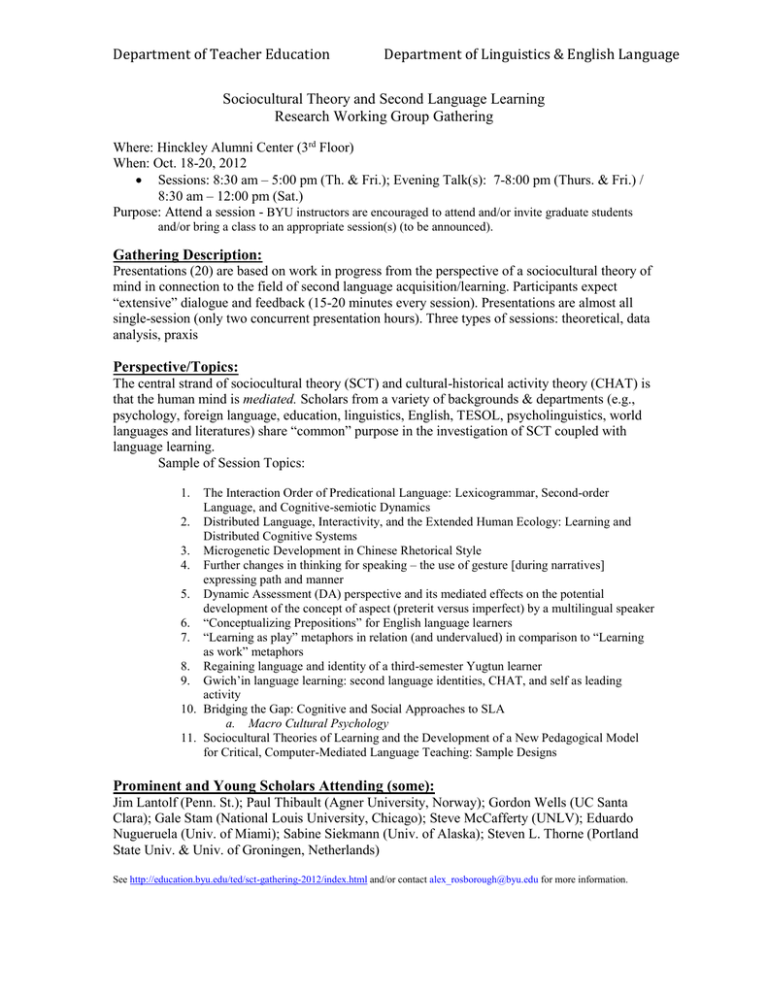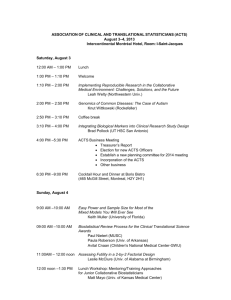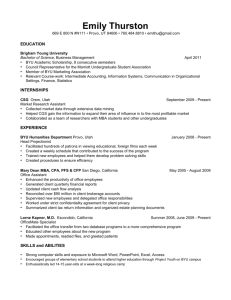Department of Teacher Education Department of Linguistics & English Language
advertisement

Department of Teacher Education Department of Linguistics & English Language Sociocultural Theory and Second Language Learning Research Working Group Gathering Where: Hinckley Alumni Center (3rd Floor) When: Oct. 18-20, 2012 Sessions: 8:30 am – 5:00 pm (Th. & Fri.); Evening Talk(s): 7-8:00 pm (Thurs. & Fri.) / 8:30 am – 12:00 pm (Sat.) Purpose: Attend a session - BYU instructors are encouraged to attend and/or invite graduate students and/or bring a class to an appropriate session(s) (to be announced). Gathering Description: Presentations (20) are based on work in progress from the perspective of a sociocultural theory of mind in connection to the field of second language acquisition/learning. Participants expect “extensive” dialogue and feedback (15-20 minutes every session). Presentations are almost all single-session (only two concurrent presentation hours). Three types of sessions: theoretical, data analysis, praxis Perspective/Topics: The central strand of sociocultural theory (SCT) and cultural-historical activity theory (CHAT) is that the human mind is mediated. Scholars from a variety of backgrounds & departments (e.g., psychology, foreign language, education, linguistics, English, TESOL, psycholinguistics, world languages and literatures) share “common” purpose in the investigation of SCT coupled with language learning. Sample of Session Topics: 1. The Interaction Order of Predicational Language: Lexicogrammar, Second-order Language, and Cognitive-semiotic Dynamics 2. Distributed Language, Interactivity, and the Extended Human Ecology: Learning and Distributed Cognitive Systems 3. Microgenetic Development in Chinese Rhetorical Style 4. Further changes in thinking for speaking – the use of gesture [during narratives] expressing path and manner 5. Dynamic Assessment (DA) perspective and its mediated effects on the potential development of the concept of aspect (preterit versus imperfect) by a multilingual speaker 6. “Conceptualizing Prepositions” for English language learners 7. “Learning as play” metaphors in relation (and undervalued) in comparison to “Learning as work” metaphors 8. Regaining language and identity of a third-semester Yugtun learner 9. Gwich’in language learning: second language identities, CHAT, and self as leading activity 10. Bridging the Gap: Cognitive and Social Approaches to SLA a. Macro Cultural Psychology 11. Sociocultural Theories of Learning and the Development of a New Pedagogical Model for Critical, Computer-Mediated Language Teaching: Sample Designs Prominent and Young Scholars Attending (some): Jim Lantolf (Penn. St.); Paul Thibault (Agner University, Norway); Gordon Wells (UC Santa Clara); Gale Stam (National Louis University, Chicago); Steve McCafferty (UNLV); Eduardo Nugueruela (Univ. of Miami); Sabine Siekmann (Univ. of Alaska); Steven L. Thorne (Portland State Univ. & Univ. of Groningen, Netherlands) See http://education.byu.edu/ted/sct-gathering-2012/index.html and/or contact alex_rosborough@byu.edu for more information.

